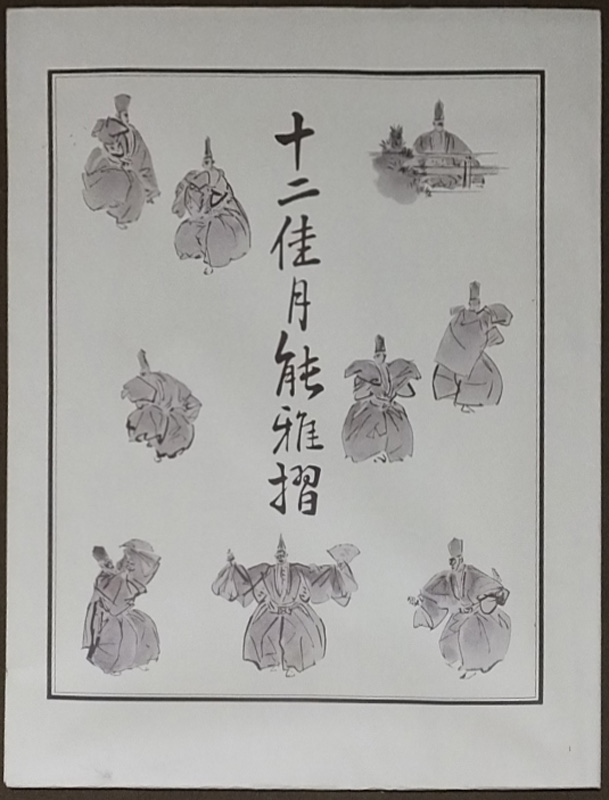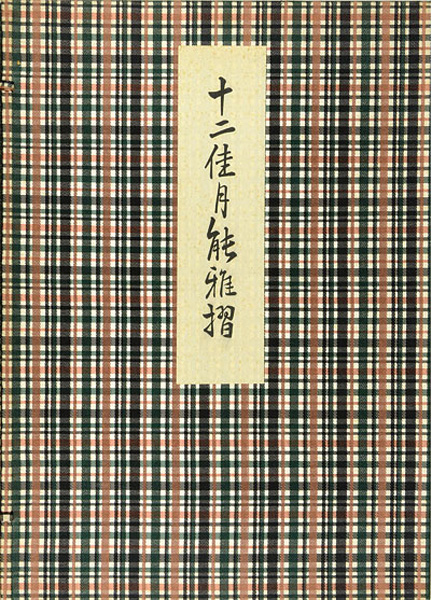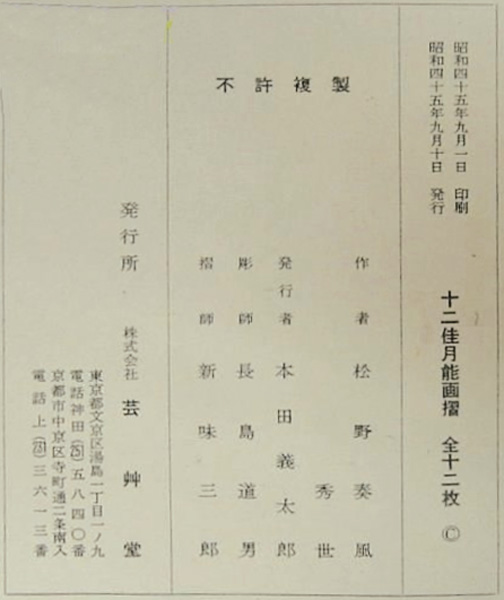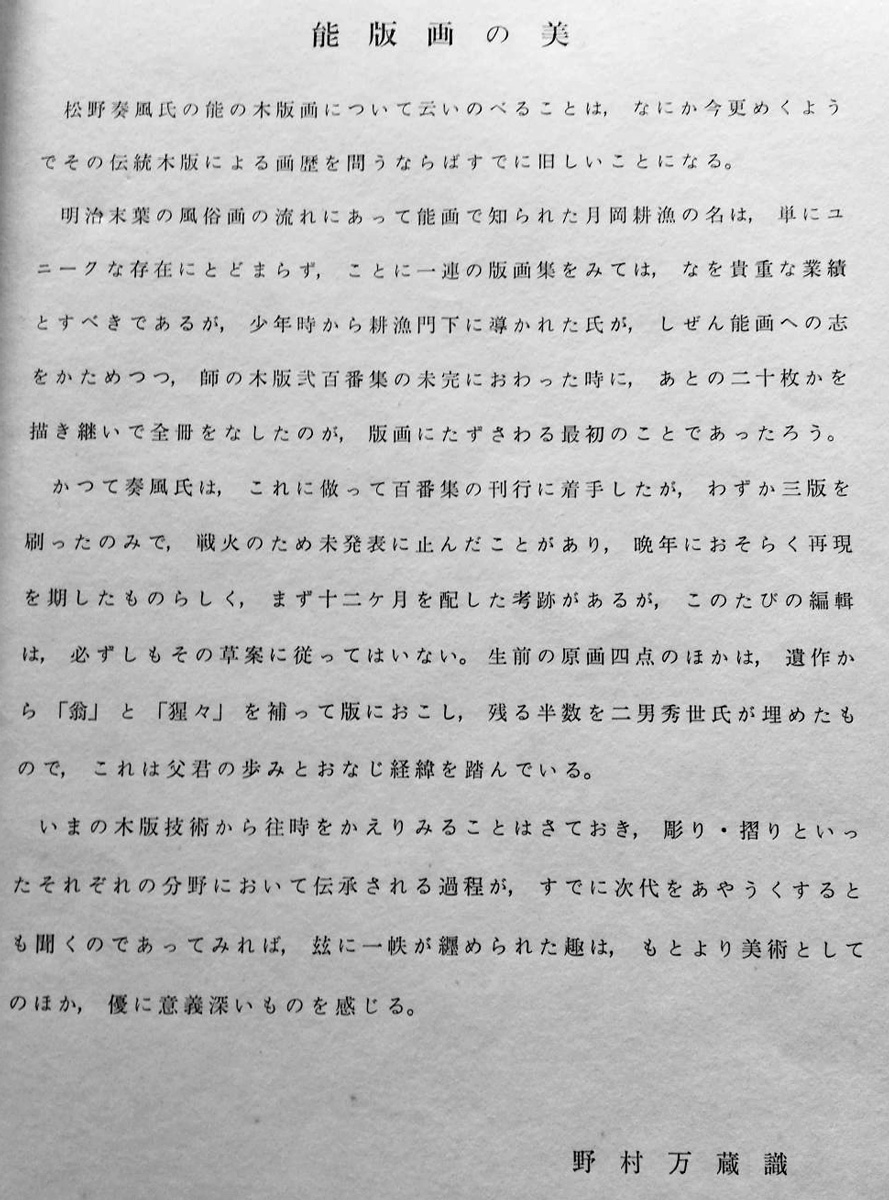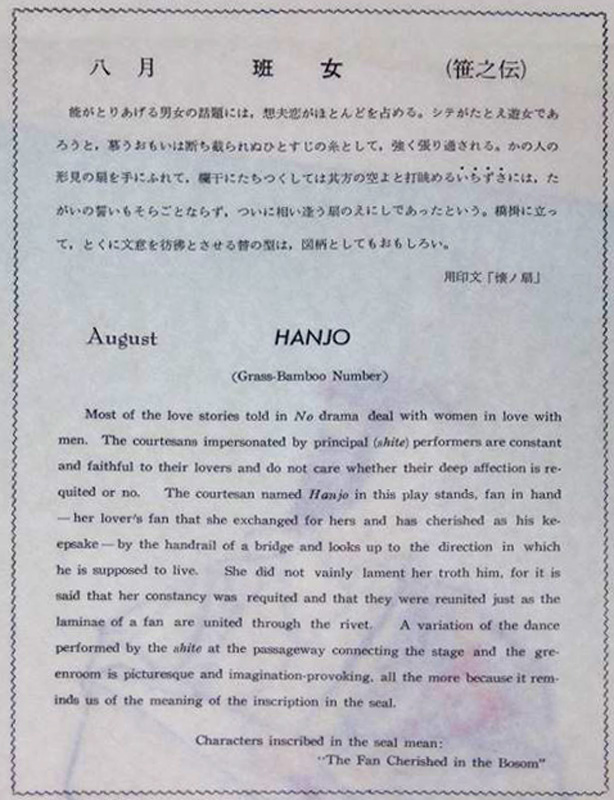About This Print and Twelve Months of Noh Pictures
"This print depicts Hanjo’s lonely, passionate, and even obsessive search for her lost love. At the end of the play, Hanjo’s lover identifies her by the fan that she has placed inside her robe and over her heart. They are once again united."1 The red seal beneath the artist's signature reads, according to the commentary sheet accompanying the print, "The Fan Cherished in the Bosom", a reference to Hanjo's holding her lover's fan under her robes, close to her body.
Twelve Months of Noh Pictures
From a series of twelve prints depicting twelve Noh plays, one play for each month, published by Unsōdō Publishing in 1970. Six of the prints (for the months of January, February, June, September, November and December) were created by Matsuno Sōfū (1899-1963) and the other six (for the months of March, April, May, July, August and October) were created by his son Matsuno Hideyo (1936-2002). As Sōfū died in 1963, his prints must have been created from existing designs.
As originally issued, the prints were sold as a set with each print placed inside its own mat, which was overlayed with a commentary sheet on the play, written by Matsuno Hideyo, in Japanese and English. The matted print and commentary were then placed inside an envelope (shown below, left) and all twelve envelopes were then placed into a cloth folio (shown below, right). Also included was a one page introduction (reproduced below), written by the kyōgen star, mask carver and author Nomura Manzō 野村万蔵 (1898-1978), who was named a Living National Treasure in 1967.
The red seals beneath the artist's signature appearing on the prints, each one being different, are translated into English on the print's commentary sheet and seem to relate to the play being pictured.
1 Scripps College Ruth Chandler Williamson Gallery website http://web-kiosk.scrippscollege.edu/Obj21664?sid=166328&x=4334681
colophonRight Column:昭和四十五年九月一日 [ Printing date: September 1, 1970]昭和四十五年九月十日 [Publishing date: September 10, 1970]十二佳月能雅摺 全十二枚 [Twelve Months of Noh Pictures. Complete set of 12 prints]
Center Column:
不許複製 [All rights reserved]作者 松野奏風 秀世 [authors Matsuno Sōfū (and) Hideyo]発行者 本田義太郎 [publisher Honda Gitarō (reading of name uncertain]彫師 長島道男 [carver Nagashima Mishio]摺師 新味三郎 [printer Shinmi Saburō]
Left Column:
発行所 株式会社 芸艸堂 [Publishing House Unsōdō Corporation]
[address, etc.]
commentary sheet included with print
The Play - HanjoNote: The term sasa-no-den, I believe, refers to a particular variation of this play.
Source: A Guide to No, P.G. O'Neill, Hinoki Shoten, 1929, p. 21-22.
By ZeamiFourth Group
All schools
Characters:
By Zeami
Fourth Group
All schools
All schools
Characters:
Act 1: Kyōgen - a woman innkeeper
Shite - the girl Hanago
Waki - Yoshida no Shōshō
Waki-tsure - a retainer
Act 2:Nochi-shite - Hanago
The woman in charge of an inn at Nogami in the province of Mino complains that since Hanago, one of the girls there, formed an attachment with Yoshida no Shōshō when he passed through there in the spring, she has refused to wait on other guests. She therefore calls Hanago to her and tells her that she must leave. Thus, when Yoshida calls at Nogami for her on his way back to the capital, he finds her gone. Sadly returning to the capital alone, he goes straight to the Shimo-Kamo Shrine to pray that they may meet again, and while he is there a mad woman comes and dances. As she does so, Yoshida notices her fan and, sending his servant to bring it to him, finds that it is the one which he gave to Hanago in exchange for hers as a token of his love, and that the woman is indeed Hanago. He then shows here the fan he carries and the two are happily reunited.
Source: Scripps College Ruth Chandler Williamson Gallery website http://web-kiosk.scrippscollege.edu/Obj20860In this play, two lovers are forced to part. They exchange fans, representing the promise of their future reunion. Hanago soon becomes heart-stricken and can do nothing more but look longingly at the fan that her lover has left behind. Thus she is nicknamed Hanjo, a name taken from the Chinese story about Han Shoyo. According to the Chinese story, when Han Shoyo was replaced by another woman as the emperor’s favorite, she wrote a poem comparing herself to a fan: once treasured during summer, the fan is quickly abandoned in autumn. This print depicts Hanjo’s lonely, passionate, and even obsessive search for her lost love. At the end of the play, Hanjo’s lover identifies her by the fan that she has placed inside her robe and over her heart. They are once again united.
For more details of this play see the-NOH.com website http://www.the-noh.com/en/plays/data/program_034.html
Source: Scripps College Ruth Chandler Williamson Gallery website http://web-kiosk.scrippscollege.edu/Obj20860
In this play, two lovers are forced to part. They exchange fans, representing the promise of their future reunion. Hanago soon becomes heart-stricken and can do nothing more but look longingly at the fan that her lover has left behind. Thus she is nicknamed Hanjo, a name taken from the Chinese story about Han Shoyo. According to the Chinese story, when Han Shoyo was replaced by another woman as the emperor’s favorite, she wrote a poem comparing herself to a fan: once treasured during summer, the fan is quickly abandoned in autumn. This print depicts Hanjo’s lonely, passionate, and even obsessive search for her lost love. At the end of the play, Hanjo’s lover identifies her by the fan that she has placed inside her robe and over her heart. They are once again united.For more details of this play see the-NOH.com website http://www.the-noh.com/en/plays/data/program_034.html
Print Details
| IHL Catalog | #1888 |
| Title |  IHL1888 title 200h web.jpg) Note: the Noh play Hanjo is seen referred to in English as "Grass-Bamboo Number", "The Girl Whose Lover Went Away" and "The Public Entertainer's Fan" among others. |
| Series/Album | Twelve Months of Noh Pictures 十二佳月能雅摺 Jūnikagetsu noh ga suri |
| Artist | Matsuno Hideyo (1936-2002) |
| Signature |  IHL1888 sig seal 200h web.jpg) |
| Seal | The commentary accompanying the print states "Characters inscribed in the seal (see above) mean: 'The Fan Cherished in the Bosom'." |
| Date | Publishing date: September 10, 1970 昭和四十五年九月十日 as printed on colophon Printing date: September 1, 1970 昭和四十五年九月一日 as printed on colophon |
| Edition | first and only |
| Publisher |  IHL1888 pub seal 150h web.jpg) |
| Carver |  IHL1888 carver150h web.jpg) |
| Printer |  IHL1888 printer150h web.jpg) |
| Impression | excellent |
| Colors | excellent |
| Condition | excellent - several spots of foxing along right side of print |
| Genre | nishiki-e; Nōgaku zue [Noh play picture] |
| Miscellaneous | |
| Format | oban |
| H x W Paper | 15 1/16 x 10 5/8 in. (38.3 x 27 cm) |
| H x W Image | 14 1/4 x 9 1/2 in. (36.2 x 24.1 cm) |
| Collections This Print | The Ruth Chandler Williamson Gallery, Scripps College 2010.1.9 |
| Reference Literature |
4/2/2021
1/10/2020
8/30/2018


 IHL1888 web.jpg)
